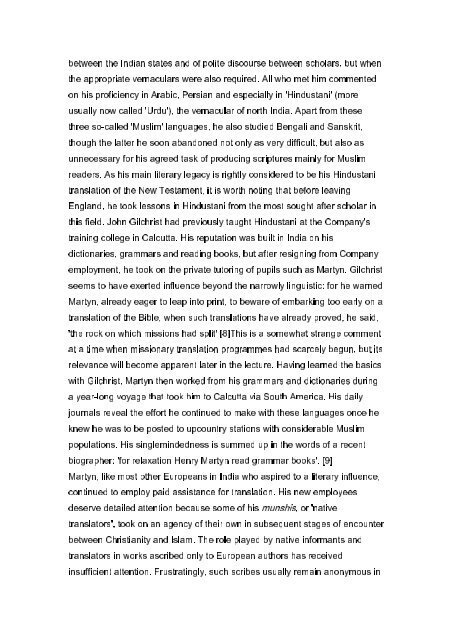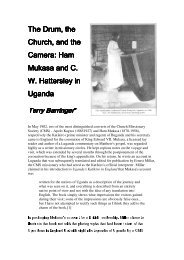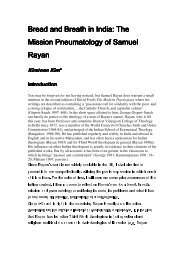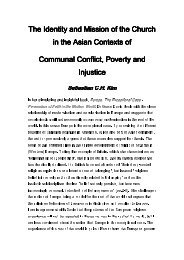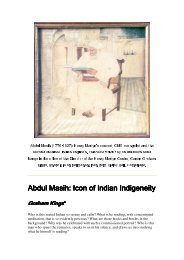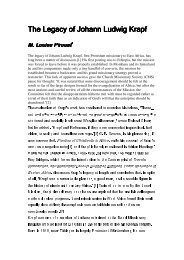the legacy of henry martyn to the study of india's muslims and islam ...
the legacy of henry martyn to the study of india's muslims and islam ...
the legacy of henry martyn to the study of india's muslims and islam ...
You also want an ePaper? Increase the reach of your titles
YUMPU automatically turns print PDFs into web optimized ePapers that Google loves.
<strong>the</strong> Indian states <strong>and</strong> <strong>of</strong> polite discourse between scholars, but when <strong>the</strong> appropriate vernaculars were also required. All who met him commented on his pr<strong>of</strong>iciency in Arabic, Persian <strong>and</strong> especially in 'Hindustani'(more<br />
usually now called 'Urdu'), <strong>the</strong> vernacular <strong>of</strong> north India. Apart from <strong>the</strong>se three so-called 'Muslim' languages, he also studied Bengali <strong>and</strong> Sanskrit, between<br />
<strong>the</strong> latter he soon ab<strong>and</strong>oned not only as very difficult, but also as unnecessary for his agreed task <strong>of</strong> producing scriptures mainly for Muslim readers. As his main literary <strong>legacy</strong> rightly considered <strong>to</strong> his Hindustani translation <strong>of</strong> <strong>the</strong> New Testament, it is worth noting that before leaving Engl<strong>and</strong>, he <strong>to</strong>ok lessons in Hindustani from <strong>the</strong> most sought after scholar though<br />
field. John Gilchrist had previously taught Hindustani at <strong>the</strong> Company's training college in Calcutta. His reputation was built India on his dictionaries, grammars <strong>and</strong> reading books, but after resigning from this<br />
<strong>to</strong>ok on <strong>the</strong> private tu<strong>to</strong>ring <strong>of</strong> pupils such as Martyn. Gilchrist seems <strong>to</strong> have exerted influence beyond <strong>the</strong> narrowly linguistic: for he warned Martyn, already eager <strong>to</strong> leap in<strong>to</strong> print, <strong>to</strong> beware <strong>of</strong> embarking <strong>to</strong>o early on a translation <strong>of</strong> <strong>the</strong> Bible, when such translations have already proved, he said, '<strong>the</strong> rock on which missions had split' [8]This is a somewhat strange comment employment,<br />
a time when missionary translation programmes had scarcely begun, but its relevance will become apparent later in <strong>the</strong> lecture. Having learned <strong>the</strong> basics with Gilchrist, Martyn <strong>the</strong>n worked from grammars <strong>and</strong> dictionaries during a year-long voyage that <strong>to</strong>ok him <strong>to</strong> Calcutta via South America. His daily journals reveal <strong>the</strong> effort he continued <strong>to</strong> make <strong>the</strong>se languages once he at was <strong>to</strong> be posted upcountry stations with considerable Muslim populations. His singlemindedness is summed up in words <strong>of</strong> a recent biographer: 'for relaxation Henry Martyn read grammar books'. [9] knew<br />
like most o<strong>the</strong>r Europeans in India who aspired <strong>to</strong> a literary influence, continued <strong>to</strong> employ paid assistance for translation. His new employees deserve detailed attention because some <strong>of</strong> his munshis, 'native transla<strong>to</strong>rs', <strong>to</strong>ok agency <strong>of</strong> <strong>the</strong>ir own in subsequent stages <strong>of</strong> encounter between Christianity <strong>and</strong> Islam. The role played by native informants <strong>and</strong> Martyn,<br />
in works ascribed only <strong>to</strong> European authors has received insufficient attention. Frustratingly, such scribes usually remain anonymous in


